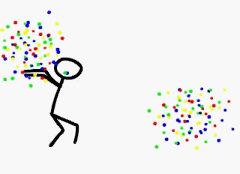One of the problems Marshall identifies is the way that composition has been identified with the material conditions of labor. I feel like I need to spend more time with her work because I was so blown away with the repeating cycles of crises in education that I couldn't really attend to that part of her argument. That's unfortunate because it's quite clear to me that this week's reading, Terms of Work in Composition: A Materialist Critique by Bruce Horner, is meant to be in conversation with Mitchell.
Horner points out that there is a distinction within the academy between intellectual labor and the material conditions that produce that labor. For academics, that means the product is valued, but the work that goes into making it is not. Research is valued and individual; teaching is not and is owned by the institution. For our students, the sanctioned writing of the academy and whether they can demonstrate that they can conform to those sanctioned forms is valued and their personal lives and the other factors that go into their student lives are not.
Essentially, Horner argues that we have to "abandon such distinctions, in effect making it our work to articulate the interpenetration of all these as constitutive of our work" (29). He suggests that composition instructors need to join students to investigate the material and social conditions in which we labor and the roles we inhabit in the communities of the academy. Many of the distinctions he makes bend my brain a bit.
Part of this is the dense prose he writes. I see echoes of 1990s academic writing style and that throws me back to my masters work. It was a tad DIY in terms of my concentration, so struggling with this text was a bit of a throwback for me.
Part of it is that I'm not entirely sure how to enact what he proposes--what does it look like "to use the course as an occasion to teach the culture of composition...[and] investigate that being students, in composition courses, has on their writing" (243). I see some potential in Horner's description of his practice of having assignments structured so that "students revisit and revise the positions they have taken in earlier papers, explicitly experiment with different positions and discourse conventions, and reflect on the significance of these experiments" (246). On the other hand, when I see Horner talking about student work in "essay 10," which is a revision of essay 7, I imagine the intersection of 125 students and 10+ essays as something like this
photo by Shehan Peruma, used under CC2.0 nc-nd
Talk about material conditions...
Part of my bendy brain comes from Horner making me pay attention to the conditions that have been glossed over in higher education and how I might have been complicit in creating the perceptions of my own work as labor, and therefore less worthy of status. Which also brings up the issue of adjunct versus full time labor in higher education.
As a high school teacher, doing adjunct work at the college was a welcome infusion of money that I spent on travel to conferences to further my own education. It was higher education almost as hobby. I don't admit that proudly, especially when I think that there are professional adjuncts and graduate students out there who can't scrape together a living wage but are entrusted with the introductory coursework that forms the basis of so many undergraduate's educations. The material conditions they encounter (lack of office space, lack of status, lack of health care) are often dismissed--"if they don't like being exploited, they should just get another job."
I can't so easily dismiss these professional colleagues, though. They do the same job as I do, and many have more experience teaching at the college level than I. Their labor, though, is somehow valued less than mine only because I made it through a hiring process.
I can't help wondering what effect the proposed America's College Promise plan would have on the labor of teaching. Will there be more adjuncts? Will introductory composition be largely abandoned by 4-year universities, further marginalizing it as the labor to be done before the intellectual work of high education begins?
It seems that the more I know, the less I am certain.
Beginner's mind, indeed.

